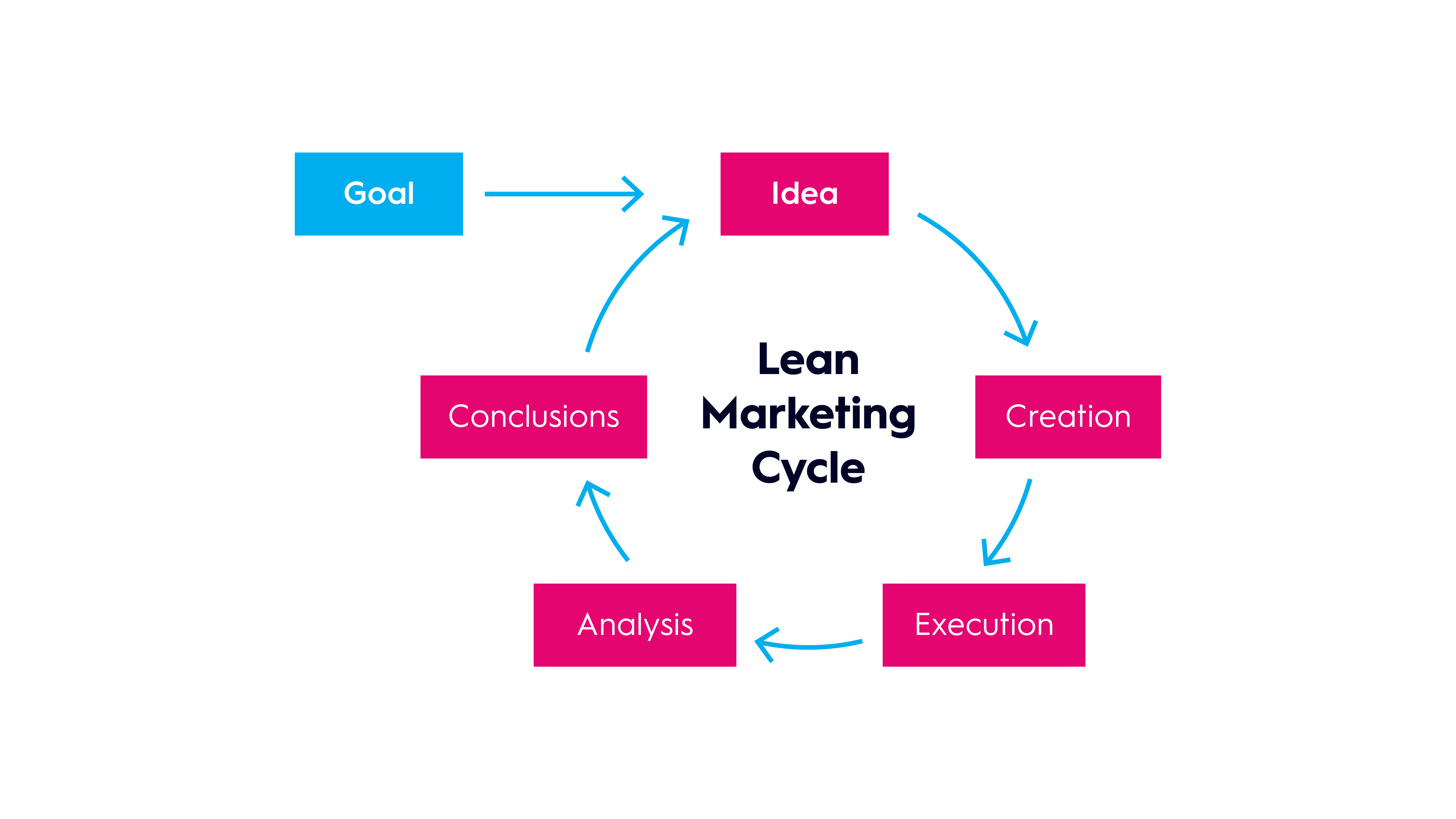What is Lean Marketing?
Lean Marketing involves building time for frequent evaluations and iterations into your marketing plan. Lean Marketing allows you to adapt and modify your strategy based on frequently received customer insights, reducing marketing ‘waste’ and saving time and budget.
Benefits of Lean Marketing
Lean Marketing
- Prioritises marketing initiatives that meet customer requirements
- Breaks down long-term deliverables into mini-projects and delivers small wins every few weeks and iterates toward optimal solutions
- Creates and executes mini-projects within weeks versus months
- Features daily status meetings on what’s working, what’s complete and what roadblocks prevent work from being achieved.
- Allows project plans to be changed quickly based on customer feedback
- Reduces marketing waste.

Lean Marketing vs Traditional Marketing
Traditional Marketing usually centres around a ‘waterfall’ approach to planning where you create one major strategy centred on a major launch, with customer feedback after the launch and little measuring of the approach’s effectiveness.
Lean Marketing shifts marketers from repeating certain activities or campaign tactics without measuring their effects to a mindset of continuous improvement and adaptivity due to changing levels of customer engagement. In addition, Lean Marketing leads to customers ultimately being integrated into the marketing process and targeted with personalised activities.

History of Lean Thinking
Lean Marketing concepts evolved from Toyota’s manufacturing principles during the early 20th century. Toyota developed a product model focused on reducing waste, continuous improvement and respect for humanity. Known as the Toyota Production System (TPS), this system focused on cost-reduction, quality and respect for the human resources used to meet their cost objectives. Variations of this system have now been applied globally across multiple industries and business processes, including healthcare, software development, customer service models and marketing. Applied to marketing, this model is also referred to as Agile Marketing.
5 principles of lean thinking
Lean thinking includes:
- Identifying value — Defining what customers and consumers find valuable. Receiving regular feedback through interviews, surveys, demographic information, web analytics and social listening is an important part of lean marketing.
- Map the value stream — Once you’ve defined what the customer finds valuable, identify all activities contributing to these values. Activities that don’t add value to the customer are considered waste.
- Create flow — After reducing or eliminating wastes from the value stream, adopt processes that ensure the flow of the remaining steps runs smoothly without interruption or delays.
- Establish Pull — Establish systems based on the needs of the end customers
- Seek perfection — Make lean thinking and continuous improvement a part of your business’s culture.
Lean Marketing and continuous improvement
As mentioned above, a key tenet of lean thinking is reducing waste and continuously improving processes. Waste from a marketing perspective includes:
- Activities — Marketing activities planned without a clear strategy
- People — More people involved than needed
- Processes — Non-value adding activities involved in communications, customer acquisition, customer processing and customer care
- Waiting — Extended delays in decision-making due to poor processes
- High communication costs
- Trial and error — Relying on trial and error to develop marketing strategies is costly.
- High lead costs — Several factors can increase your costs per lead, including funnel leakage and unnecessary discounts.
- Budget cuts – Cutting marketing funds can lead to waste due to losing assets, programs and momentum.
- Lack of customer research – Failure to engage audience sentiment regularly reduces your ability to assess market impact and wastes resources on ineffective campaigns.
Taiicho Ohno, an industrial engineer at Toyota Motor Corporation, defined seven wastes as part of the TPS. Payaro & Papa (2016) studied the types of waste outlined by Ohno (see Table 2) and how they apply to marketing, along with tools to help evaluate marketing function and reduce waste.

Payaro & Papa applied lean principles to areas of marketing waste across ten SMEs and found Ohno’s classification of waste valid in the context of marketing and applied the above tools to relevant areas of waste across the ten businesses in the study and found Ohno’s model helped them:
- Identify tools that improve customer satisfaction more quickly
- Increase customer knowledge levels
- Increase customer satisfaction
- Reduced process cycle time
- Positively affect other business functions, including distribution and research & development.
Measuring Lean Marketing effectiveness
Determining how to measure the effectiveness of lean marketing activities will depend on your business and your business goals. However, basic lean marketing metrics you should be watching include:
- Customer acquisition cost — How much does it cost to acquire a single customer
- Customer lifetime value — The amount of earnings you can expect from an average customer over the life of the relationship.
- Conversion rate — How many new customers do you acquire on an average day and how many buy something?
- Profit margin — What is the profit margin on the individual products or services you offer?
- Percentage of repeat business — How many of your customers are repeat customers?
How do I get started with Lean Marketing
Adopting Lean Marketing principles will keep your business customer-focused, productive and working on key priorities. For example, CMOs in some industries no longer have months to develop and execute brand launches and re-launches. Viabrand®is an experienced Brisbane marketing company and branding agency that can help develop and execute agile marketing plans. Book a complimentary, no-obligation 30-minute call to learn more: https://calendly.com/viabrand/30min
